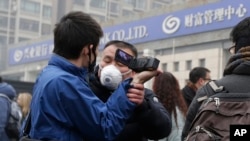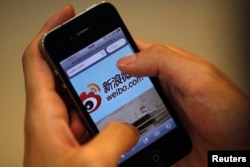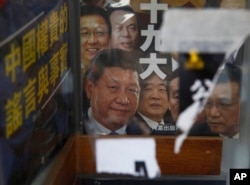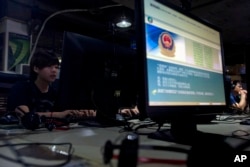China's recent announcement of a stringent new publishing law for online content and a visit by the country’s increasingly powerful leader to several state-run media headquarters is but the latest chilling sign of President Xi Jinping’s efforts to exert increasing control over society, analysts say.
But, it also highlights the limits of that authority as well.
From academia to culture, technology and science, the party is looming large, casting an ever-expanding shadow.
Since rising to power nearly three years ago, Xi Jinping has exerted increasing control over society, cracking down on dissidents and detaining anyone perceived to be a threat to stability in the view of the Communist Party.
Xi wants music and art to reflect Chinese socialist values, and late last year, the party even ordered its own members to not play golf, meet alone and criticize the party.
When Xi visited the headquarters of party-backed media organizations late last week, flanked by a group of other older men, all donning the same bland wind jacket, the message to editors and reporters was similar: they must pledge absolute loyalty to the party and closely follow its leadership in "thought, politics and action.''
Some who work for state-run media say the visit highlights just how bad things have become since Xi came to power. “While there used to be some room to maneuver and do our work, now there is little room left at all,” said one source who did not want to be named.
Serve public or party?
On social media, the visit has sparked a backlash from some, led by prominent commentator and real estate tycoon Ren Zhiqiang, who is also known by his nickname “Big Cannon.”
In a post that was later taken down, Ren argued that it was the public, not the party leadership, that such media organizations should serve; especially since they get their funding from taxpayers.
A quote from former Communist Party leader Deng Xiaoping was also making the rounds on Sina Weibo, the Chinese version of Twitter, as many voiced concerns about recent moves even as the party is seeking to tighten its chokehold on speech.
“The one thing a revolutionary party does not need to worry about is its inability to hear the voice of the people. The thing to be feared the most is silence," a tweet of the Deng quote read.
In response, one user who goes by the name “Zhang Wenwen’s Little Friend” wrote: “I feel like our country is heading in a bad direction and that if we go any further there may be no turning back. I hope I am wrong.”
History repeats itself
Others such as Lu Zheng the Brave saw the situation from a historical perspective. Many of China’s current leaders, including Xi, grew up during China’s disastrous and deadly Cultural Revolution era.
Xi’s own father was jailed during the period.
“Now it is those who were victimized during the Cultural Revolution who are using those same methods to victimize others,” Lu Zheng wrote.
Chinese historian and political commentator Zhang Lifan said that while the government can crackdown and tighten up things for a while, ultimately things will loosen up again, adding that social media is especially difficult to control.
Zhang said that right now there is a fierce battle going on between two camps, the party and private media, and it is clear that the party has lost control.
“The leadership is trying to dominate the battle for public opinion,” Zhang said. “But right now it is a situation where each side is just voicing its own views. The public on the other hand, does not believe the government’s propaganda, and just searches out information on its own.”
Online content controls
The new publishing law, the details of which that were revealed just days before Xi’s visit to the media outlets, goes into effect on March 10. The law requires digital publishers of everything from scientific to cultural content and online games to seek approval before they can operate online.
One hurdle includes permission from a total of 32 propaganda departments in all of China’s provinces, municipalities and special administrative regions.
And that is just one of a lengthy list of requirements, in addition to information about the publishing companies financial records, professional experience of its managers and a place of business.
How tightly the rules will be enforced is a big question as is the possible impact the rules could have on foreign firms. What several analyst noted is that the law appears to be aimed at closing existing loopholes that exist online for publishing and online games.
“This is similar to a regulation last year targeting online videos/ foreign TV shows, they closed a loophole allowing streaming shows/self-produced videos without pre-approval from the governments,” said Percy Alpha, an independent Internet freedom researcher.
He said that gaming is a natural step forward to tighten controls, but adds that it appears to be more aimed at control, rather than creating barriers for competition as foreign cloud services are already blocked.
“There will be loop holes,” Alpha adds. “However, the law will have more of a chilling effect to make those [with] relevant content self-comply [or self-censor] before publication."
Publishers who violate the lengthy regulations could be banned from the sector for up to 10 years, and that’s a huge career incentive for self-censorship.
Foreign ban
So far, the new publishing law has sparked the biggest concerns from foreign media because of its ban of foreign companies – even those in joint ventures – from producing content online.
Whether that means that content produced by foreign media could not be published or sold online, or whether foreigners or Chinese alike can purchase and download electronic books from sites such as Kindle or even play online games on the Steam gaming website is unclear.
“What’s new about this, in my view the most important thing, is that it includes provisions on the fact that publications that are going to be offered for sale on the Chinese Internet will have to be stored on Chinese servers,” said Rogier Creemers, a lecturer of politics and history of China at Oxford University.
Creemers said that while there will be huge questions about legality and enforcement powers, the regulations are not necessarily a big change for domestic publishers, but “an extension to the Internet of a situation that existed for quite a long time.”







